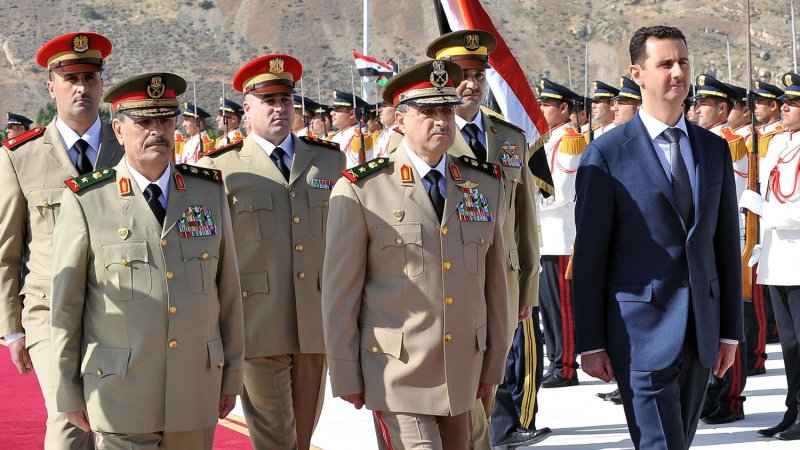A picture dated May 6, 2011 and released by the Syrian Arab News Agency (SANA) shows Syrian President Bashar al-Assad (R), Minister of Defense, Lieutenant General Daoud Rajha (C), and Chief of the General Staff, General Fahid al-Freij (2L), attending a ceremony at the tomb of the unknown soldier in Damascus. Syrian President Bashar al-Assad appointed Freij as the new defence minister on July 18, 2012, after Rajha was killed the same day in a suiicde bomb blast that killed two top regime officials. UPI |
License Photo
BEIRUT, Lebanon, Dec. 6 (UPI) -- As government troops battle rebels inside Damascus, Syrian President Bashar Assad and his inner circle appear to be stepping up diplomatic efforts to negotiate a safe exit after 20 months of civil war.
There is growing speculation that the departure from Damascus of Foreign Ministry spokesman Jihad Makdisi, one of the highest ranking Christians in the regime, wasn't a defection as reported but a mission to the West to arrange a get-out deal for the Assad clan and its key allies.
The Guardian newspaper in London reported that Makdisi hadn't arrived in London, where he'd once served in the Syrian Embassy, as had been widely reported. Citing "usually reliable diplomatic sources," the newspaper said Tuesday Makdisi was en route to the United States after his departure from Damascus Monday via Beirut had been facilitated by the regime and made out to be a defection.
British government officials say Makdisi, a longtime Assad loyalist who has been the regime's face since the Syrian uprising erupted March 15, 2011, isn't in the United Kingdom. In Washington, U.S. officials aren't saying anything.
The U.S. global security consultancy Stratfor said it had "received indications" Makdisi's departure from Damascus was "in fact, facilitated by the regime ... to negotiate a safe exit for the Assad clan and guarantee the security of Syrian minorities in a post-Assad Syria."
It noted that Syrian Prime Minister Riad Hijab, who supposedly fled to Jordan in August, was also sent by the regime to parlay a deal. He's "been central to the negotiations with Russian and the United States to provide a safe exit and immunity for Assad," Stratfor said.
Another presumed defector, Deputy Foreign Minister Faisal al-Miqdad "has been holding meetings in Cuba, Venezuela and Ecuador, presumably to seek political asylum for the Assad clan and its close associates," Stratfor observed.
On Nov. 6, British Prime Minister David Cameron, a leading critic of Assad, said he would endorse "anything, anything to get that man out of the country and to have a safe transition in Syria.
"Of course, I would favor him facing the full force of international law and justice for what he's done.
"I'm certainly not offering him an exit plan to Britain but if he wants to leave he could leave," Cameron declared. "That could be arranged."
Since then, Assad's situation has deteriorated.
Russia, a key ally and arms supplier, appears to be backing off. Russian President Vladimir Putin said in Ankara Monday that Moscow hadn't enrolled as the defender of the regime, the closest he's come to distancing himself from Damascus.
Assad will be dangerously exposed if Moscow does abandon him.
Meantime, rebel forces in the north are gaining and holding a large area along the Turkish border.
This provides supply routes through which the rebels receive arms and supplies from Turkey, Saudi Arabia and Qatar, as well as U.S., French and British intelligence support.
They've captured a string of military bases and airfields in the north and east. There are strong indications they've acquired portable surface-to-air missiles to counter Assad's airstrikes.
They hold much of the northern city of Aleppo, Syria's commercial center, despite repeated counterattacks by Assad's diehard units.
It's the same in Damascus, where regime forces have been unable to dislodge the rebels from several districts and around the international airport.
These tactical victories have humiliated the regime and given momentum to a rebel offensive that's been building up since the summer.
The long-disparate rebel groups have made a major effort, after intense urging by Arab and Western powers, to form a cohesive force with military objectives and a political program for a post-regime government.
Cracks are appearing in the regime's forces, with a flood of defections.
But core units of the regime controlled by the minority Alawite sect, such as the Republican Guard and the elite 4th Armored Division led by Assad's headstrong brother Maher, have remained loyal.
The majority Sunnis are defecting in droves but they totaled only 4,000 out of 27,000 officers in the military. Some 22,000 are Alawite and only a handful of them are reported to have fled.
The Guardian noted in an editorial Tuesday, headed "Assad's last stand," that "a huge battle, perhaps the decisive one of the Syrian civil war, is about to erupt in Damascus."





